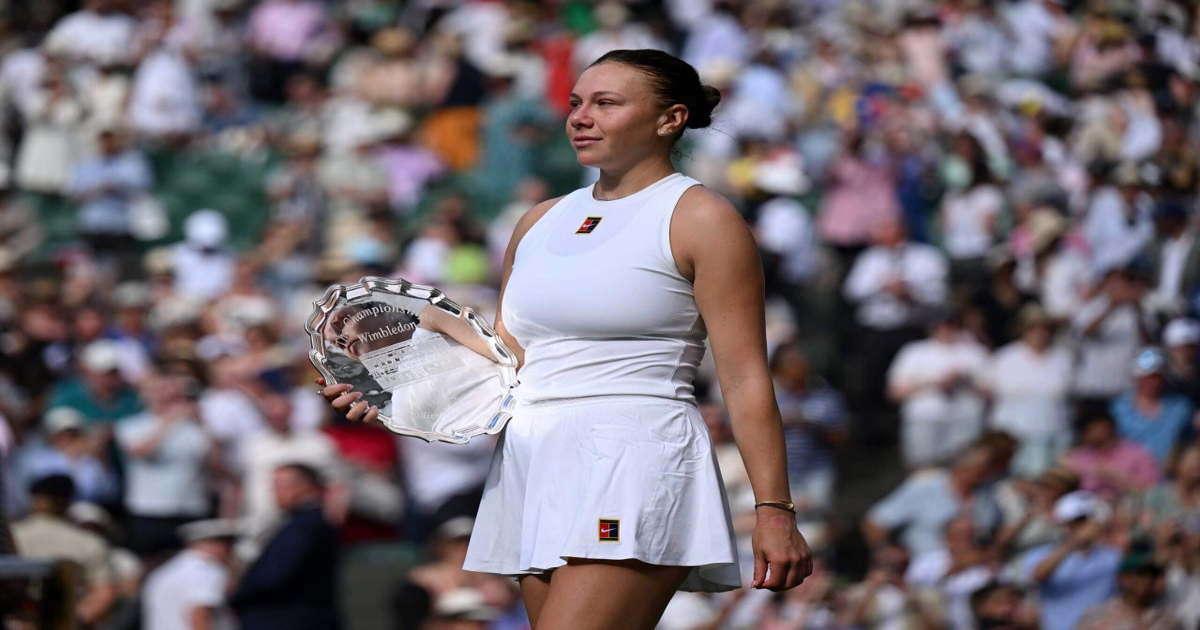THE ALL ENGLAND CLUB, LONDON — The Wimbledon final is where every aspiring tennis player dreams to be one day. For an hour Saturday, that dream became a nightmare for Amanda Anisimova.
Her 6-0, 6-0 rout at the hands of a ruthless Iga Świątek was a reminder that no sport is more psychologically brutal than tennis.
Anisimova’s first major final, everything her career had been building towards, was over in 57 devastating minutes.
In team sports, there is a place to hide. Getting hammered in a final can happen to any side, but teammates can share the pain. There are tactics that can limit the number of goals or points conceded. And there is a clock to be watched that ticks down toward relief.
Tennis has no clock, no bell, no ninth inning. Players just have to keep going. And in Anisimova’s case, she had to keep on going today against the most relentlessly dominant player in women’s tennis. Świątek, who races away with a lead like no one else, was still fist-pumping in the 12th and final game, when the destination of the title had long been decided.
Against other players, including those on Świątek’s level, Anisimova might have hoped for a loose game thrown her way. But the Pole, who is now 6-0 in Grand Slam finals, does not do loose games when the biggest titles are on the line. She showed no mercy as Anisimova suffered the ultimate tennis indignity of a double bagel, the thing that every player, whether an amateur, a junior pro taking their first tentative steps in the sport, or a WTA star like the 23-year-old American, dreads.
There was also a crushing inevitability to it.
After just a few games, the name of Natasha Zvereva started rising into view.
Zvereva, a talented Belarusian who was once ranked No. 5 in the world and won 20 Grand Slam titles in women’s and mixed doubles, was until Saturday the only player to suffer a double-bagel in a Grand Slam final during the Open Era. Her name re-enters the tennis lexicon at times like these, like a dreaded ghost from that 1988 French Open final, when Steffi Graf did to her what Świątek did to Anisimova.
Anisimova’s career will outlast and exceed this moment. But in its immediate aftermath, and as it unfolded, she became one of the most sympathetic and relatable characters in the world.
Everyone has feared freezing at the biggest moments in their lives. Some have done so for real. But for the vast majority, it does not happen in front of a global TV audience, and 15,000 spectators on the most famous tennis court on the planet.

After the torture was over, Anisimova covered her head with a towel before asking to leave the court. When she came back, to a huge reception from the sympathetic crowd, she was still tearful. Anisimova was so disorientated that she wandered over to the wrong spot after receiving the runners-up’s plate and had to be shuffled back into position. Her voice inevitably wavered and the tears came again when she began to speak.
Making the loser give an address after a Grand Slam final defeat is another aspect of tennis’s unrivalled sadism.
During a touching speech, Anisimova revealed that her mother had flown to the UK for the final and said, “My mom is the most selfless person I know, and she’s done everything to get me to this point in my life.”
For Anisimova to even have been in the position to suffer Saturday’s humiliation was a remarkable achievement.
A teen sensation who reached the French Open semifinals in 2019, she spent several years in the tennis wilderness following the sudden death of her father and coach when she was 17.
When she returned to the sport at the start of 2024, after taking a break for burnout, she was barely inside the world’s top 200. At last year’s Wimbledon, she lost in the final round of qualifying. This time, she beat Aryna Sabalenka, the world No.1 and tournament favorite, for the right to face Świątek in the final.
But none of that insulates a player from the torment of being exposed in the way Anisimova was on Saturday.
“I feel heartbroken for Anisimova,” two-time U.S. Open champion Tracy Austin said during commentary for the BBC.
“Walking onto Centre Court today, she had to be so proud — it was the moment of her life. And then 50-something minutes later… When you’re losing like that, you just want to climb into a hole. Fifteen-thousand people are watching. But I hope and pray that Anisimova is really proud of what she’s done. This is just the beginning for her.”
Anisimova was similarly positive in her post-match news conference, and what separates elite athletes like her from the rest of the world is the ability to recover mentally from these situations.
She spoke about being “frozen there with my nerves” and admitted that she was “a little bit in shock after” but also stressed the positives. Anisimova also revealed she had been struggling with fatigue in the lead-up to the final, skipping practice Friday and still having to take a break after every rally at practice this morning. She felt like this loss was about physical issues she needed to resolve, rather than psychological ones.
Her message to herself?
“(That) This is probably going to make (me) stronger in the end, and to not really dig myself down or put myself down after today. Just try and focus on how I can come out stronger after this.”
Being around her loved ones will help, she said.
Again, anyone could relate.
(Top photo: Visionhaus / Getty Images)
